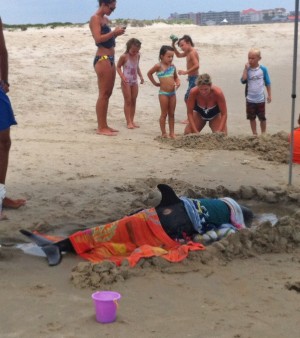
ASSATEAGUE — A dolphin that beached itself on Assateague last Sunday did not survive the trip to the National Aquarium in Baltimore for potential rehabilitation, despite a massive public-private effort to save the creature.
When local resident Adam Carson and his family and friends headed down to the Wedge at Assateague last Sunday on his pontoon boat for a little recreational boating, they didn’t anticipate finding themselves in the middle of a Herculean effort to save a dolphin that had beached itself on the barrier island. Carson and his crew had just pulled into the area near the Wedge when they saw dozens of people gathered around the injured or sick dolphin that had beached itself in the surf line at the water’s edge.
“They had put a temporary canopy over the dolphin and had dug a moat around it and built a barrier out of sand to keep the surf, which was pretty heavy, from pounding it,” said Carson this week. “Kids and adults were taking turns getting buckets of water to keep it hydrated.”
A short time later, two Ocean City Beach Patrol guards arrived by wave runner along with a Coast Guard officer from Station Ocean City. An Assateague State Park ranger arrived shortly thereafter, along with local Debbie Quilter, representing the National Aquarium’s Marine Animal Rescue Program (MARP). Carson said it became clear the dolphin’s health was rapidly deteriorating and it needed to be taken off the beach and sent on its way to a possible rescue and rehabilitation.
Because of the fairly remote location, a land-based rescue by truck across the beach, then off the island and up Route 611 and eventually across the Route 50 bridge to the Coast Guard station in Ocean City would have been too time consuming. At that point, Carson offered the use of his pontoon boat nearby to expedite the rescue.
“There was some discussion about loading it into a Jeep for transport to Ocean City, but the consensus was it would have taken too long for the dolphin out of the water in that heat,” he said. “I told them my boat was anchored nearby at the Wedge and I would be glad to help if we could get the dolphin loaded on to it.”
The National Aquarium representative, the OCBP officers, who were trained to intervene in marine animal strandings, the state park ranger and the Coast Guard representative all agreed that was the best course of action.
“We loaded it into a sling and carried it down the beach to the water,” said Carson. “We didn’t have any poles and it was heavy and difficult. We were able to load it onto my boat and it fit perfectly between the seats on my 23-foot pontoon and we raced over the Coast Guard station in Ocean City. That was the end of the story for us and I’m not sure what happened after that. I was told they typically didn’t make it, but because we saved precious time by transporting the dolphin by boat, there was some hope.”
Alas, the dolphin did not survive the trip to the National Aquarium and the story did not have a happy ending, despite a gallant effort by all involved to save the creature.
“Unfortunately, we did not have a positive outcome with this one,” said Jennifer Dittmar, stranding coordinator with the National Aquarium. “During transport, its condition started deteriorating rapidly. It had been on the beach for several hours, likely since the last high tide, and its organs are not used to the pressure of supporting its body weight for that long.”
In an ironic twist to the story, Dittmar said a more direct rescue route across the beach was blocked by an area designated off limits for off-road vehicles because of nesting piping plovers. Vehicle traffic is prohibited in vast areas of the barrier island this time of year because of the nesting of the piping plovers, an endangered species that hatch their young on Assateague each summer.
Despite the outcome, Dittmar praised the gallant efforts by the private citizens, including Carson, who offered the use of his boat, and the dozens of adults and children who rallied to keep the dolphin hydrated and protected. Dittmar also praised the efforts of the public sector, including the Coast Guard, the state park ranger, the OCBP guard, who had been specifically trained to assist with strandings, and of course, the MARP volunteers.
“Things were very hectic, but it was an amazing collaborative effort by everybody,” she said. “The folks on the scene did everything they could to help and did everything the right way. Unfortunately, these things happen and it’s just part of nature.”
Dittmar explained there are several recourses available for private citizens when they see marine animals stranded on the beach or sick or injured in the water. She recommended calling the Coast Guard or the Maryland Natural Resources Police (NRP) at 1-800-628-9944. The National Aquarium’s stranding hotline is 410-373-0083.
